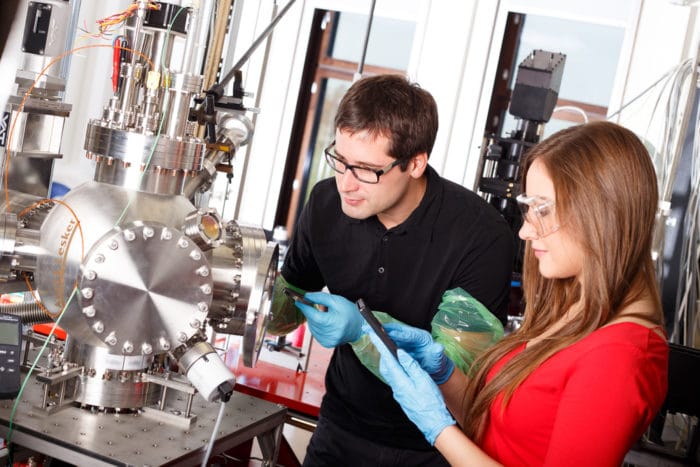Why We Love It
-
$110,220Potential Avg. Salary*
* Salary & growth data is based on the recent Bureau of Labor and Statistics data published at https://www.bls.gov/oes/current/oes192011.htm for 19-2011 Astronomers 11/2021. Based on national data, not school-specific information. Conditions in your area may vary.
The skills of physicists are required in many industries. Individuals with a deep knowledge of physics work in astrophysics for companies like NASA, in education as science teachers and physics professors, and in engineering as aerospace engineers.
With a bachelor of science in physics, you’ll gain the knowledge needed to succeed in graduate school and earn the degrees needed to work in these careers.
What is a Degree in Physics?
Physics is the study of matter and energy. Physicists as researchers and developers who explore the structure of atoms and the properties of things like electricity, radiation, and sound, using what they learn to drive innovation in a variety of industries.
Astrophysicists study the universe, build the technologies used for space travel, and postulate on astrological phenomena, and this is just one of the possible careers that graduates of physics programs can pursue after earning their degrees in the field.
In a physics program, you’ll take science- and math-intensive courses in subjects like biophysics, cosmology, relativity, lasers, and nuclear physics, among others. You’ll learn about quantum mechanics, study topics like string theory, and take a deep dive into thermodynamics.
A physics bachelor’s degree is most commonly followed by graduate school and offers great preparation for master’s and doctoral degrees in the field. Graduates go on to find work in aerospace engineering, education, and research roles.
Recommended Schools
What Courses Would I Take For a Major in Physics?
- Thermodynamics & Statistical Mechanics
- Classical Mechanics & Mathematical Physics
- Quantum Physics
- Experimental Physics
- Electricity & Magnetism
- Astrophysics
- Condensed Matter Physics
- General Relativity
What Jobs Can You Get with a Degree in Physics?
Demand for physicists is expected to be consistent with the national average for all other careers in the coming decade, so graduates will be as likely to find work in their field as graduates of other majors.
Job opportunities are expected to be the greatest in the research and development fields, so graduates may have the best chance of finding work as researchers, assistants, and technologists in government, university, and provide laboratories. Physicists will also be needed to work for organizations like NASA.
How Long does it take?
A bachelors in Physics will have a typical length of 4 years in a full time schedule. That said, there are many ways to speed up the timeframe by either taking more units via online coursework, community college, or taking free classes at OnlineDegree.com that could transfer to universities in the US.
Recommended Schools
Best Jobs for Physics Degrees
Many graduates of physics bachelor’s degree program find work as assistants and technologists in research laboratories, but there are other career opportunities as well.
Individuals educated in physics are needed to work as aerospace engineers, to teach physics courses in high schools and colleges, to develop exhibits at science museums, and to conduct research that enables innovation in healthcare.
How to save time and money
Our mission is to help you to avoid paying full price for college. We want your Physics degree to be affordable and accessible. Here’s how you could save:
Create Your Free SmartPlan

There are many ways to make college affordable and accessible.
That’s why we created a helpful tool called SmartPlan.
It’s free, and helps you find potential ways to save and tons of information about each school you’re considering
Think of it as your “college blueprint”, to help you instantly craft a path to your degree:
- Which Colleges Match Your Needs
- Ways You Could Save Time & Money
- Free Courses You Could Take for Credit
- Valuable Data and Insights on Each College
- Detailed Steps You Should Take!
See what’s possible for you and generate a free plan within just a few minutes
Create My SmartPlanYou Might also be Interested in
Many visitors who look for a degree in Physics are also interested in the following degrees.













